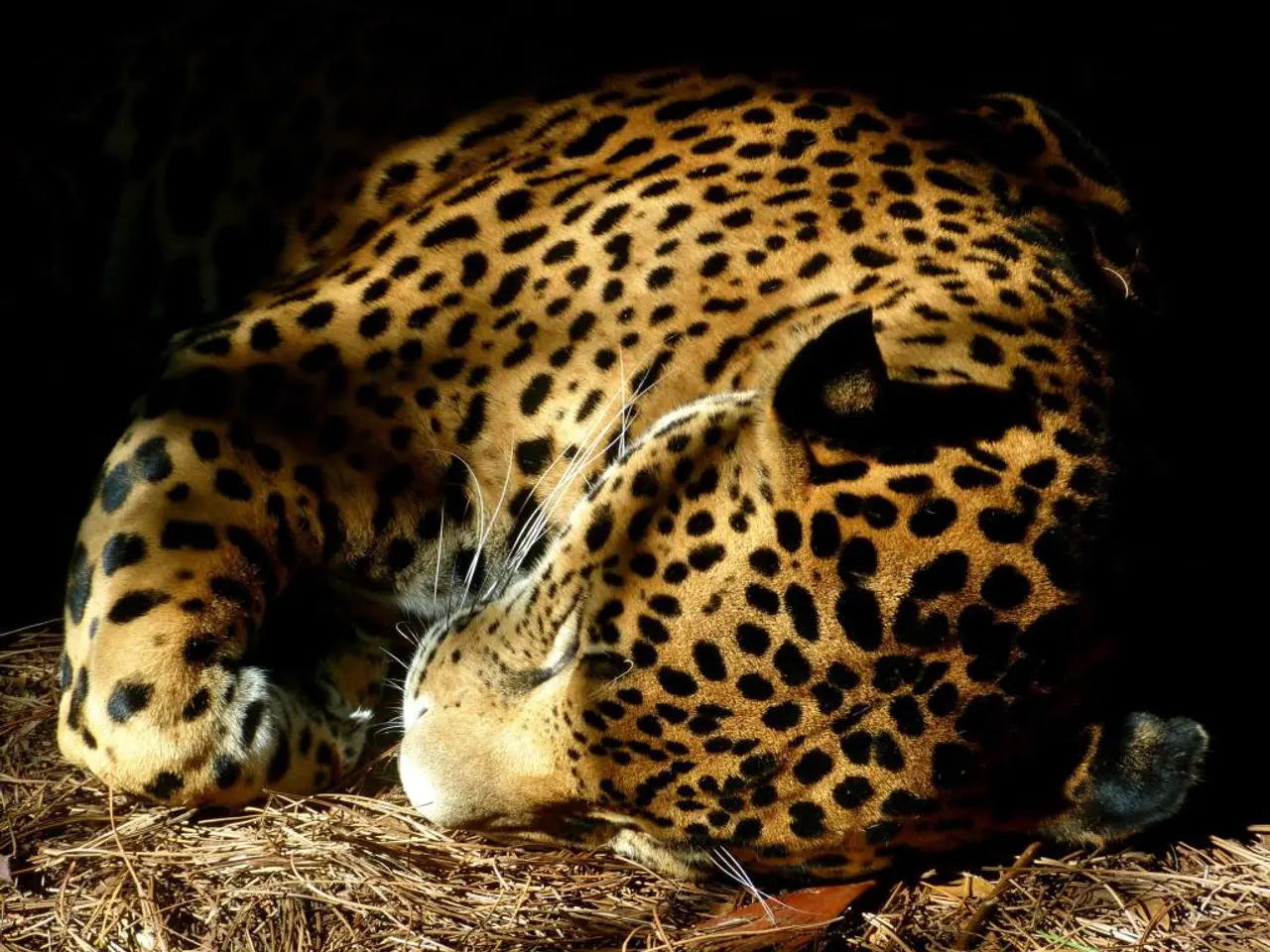Resting After a Hard Day: Orangutans, Much Like Humans, Doze Off After a Long Night
In a remarkable breakthrough, a team of international researchers has delved into the sleep habits of wild adult orangutans, shedding light on their nocturnal lives in the Indonesian rainforest. The study, conducted over a span of 14 years at the Suaq Balimbing Monitoring Station in Sumatra, involved researchers from the University of Konstanz, Universitas Nasional, Indonesia, and the Max Planck Institute of Animal Behaviour [1][2][4].
The researchers faced a significant challenge in tracking the sleep patterns of these elusive creatures high in the treetops without disturbing them. To overcome this, they capitalised on the orangutans' natural nesting behaviour [1]. Each night, orangutans construct a "nest" in the canopy by weaving branches into a platform with leafy mattress and pillow components, where they sleep alone, except for mothers with nursing young [1].
Direct visual observation of orangutans in their nests from the ground was almost impossible. Instead, the team relied on acoustic monitoring, listening for sounds of nest-building and the prolonged silence during the night, which they referred to as the 'sleep period' [1][3]. This silent stretch was used as a proxy for actual sleep.
The study revealed that the average sleep period for the orangutans was nearly 13 hours long [1][2]. This finding was supported by previous studies in captive orangutans and wild baboons that showed strong correlations between these silent sleep periods and actual sleep time, thereby validating this indirect approach [1][2].
The researchers also documented daytime napping behaviour, which compensated for lost overnight sleep. They found that orangutans who lost sleep due to social interactions or disruptions tended to nap for 5 to 10 minutes longer for every hour of sleep they missed from the night before [2][3]. This complex sleep regulation and its social influences, such as shorter sleep when sleeping near others, colder temperatures, or longer daily travel distances, were revealed [2][3].
According to the study's first author, Alison Ashbury, moving through the canopy, finding food, solving problems, and navigating social relationships are tiring and cognitively demanding tasks for orangutans [3]. MPI-AB's director expressed the importance of bringing sleep research out of the lab and into the field to answer questions about why animals, including orangutans, spend such large portions of their lives in an unconscious state [4].
The study, originally published in Cosmos, has opened up new avenues for sleep research in the wild, with co-author Meg Crofoot hoping that it will inspire more studies in this area [2]. The research was published in Current Biology [5]. Co-author Meg Crofoot suggests that these daytime naps may help orangutans reset physiologically and cognitively after a poor night's sleep, similar to humans [3].
The Suaq orangutans, which built the highest number of nests during the day and displayed the highest amount of cognitively demanding behaviours, were observed to have a relatively high propensity for daytime nest use [3]. The team's goal was to broaden our understanding of how sleep, including human sleep, evolved by studying sleep in the wild, in the natural social and ecological conditions under which it evolved [4].
Despite the challenges in tracking the sleep patterns of orangutans in the wild, the study has filled a significant gap in understanding how these intelligent creatures cope with sleep deprivation and getting enough rest [6]. The research team's innovative approach, combining acoustic monitoring of nest-building and silence periods high in the canopy with behavioural ecology observations, has enabled reliable inference of orangutan sleep patterns without invasive measures or disturbing the animals [1][2][3][4].
The study of orangutan sleep patterns revealed that these intelligent apes, even in the wild, prioritize health-and-wellness by napping during the day to compensate for lost sleep, suggesting a similarity with human rest routines. The importance of mental-health, as evidenced by the cognitive demands of their daily activities, seems to drive the need for adequate sleep and recovery time, as found in the orangutans' complex sleep regulation and social influences.




